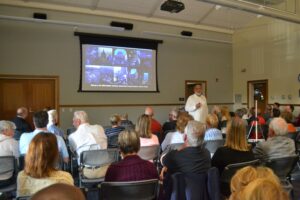
BERLIN – A renowned planner discussed the benefits of infill development and the importance of towns in front of a crowd of interested residents at the library last week.
Planner and urbanist Dhiru Thadani spoke to a crowd of about 100 residents last week during a growth discussion at the library. The town hired Thadani to look at Berlin and make suggestions as the town prepares to update its comprehensive plan.
“This is part of a multi-phase process as we move forward,” Mayor Zack Tyndall said.
Thadani spent two days in Berlin earlier this month and returned last Thursday to share his views regarding the town. He talked about the importance of cities and towns as the places people transferred knowledge and inspired youth. Thadani also addressed the need for small businesses both for practical purposes as well as tourism.
“That’s what makes places interesting,” he said.
Along with his observations on the importance of towns and their mainstays—civic institutions, residences and small businesses—he also talked about how municipalities didn’t necessarily benefit from traditional zoning codes.
“Zoning has not produced anything in any place worthwhile,” he said.
Instead, he believes there is more benefit from form-based codes—codes that support mixed-use, walkable development that helps create a sense of place. He said a mix of public space, civic institutions and private property needed to coexist.
“We need to have all these things in close proximity,” he said. “Zoning doesn’t let us do that.”
Thadani spoke in favor of accessory dwelling units, concepts like apartments above garages as well as cottage courts, where a cluster of homes is built together. He said live/work units, like some of the mixed-use buildings in downtown Berlin, were great for communities because they were more affordable and they reduced traffic.
While the town’s narrow streets are sometimes a source of complaint, Thadani said narrow streets and small blocks reduced speeding and enhanced walkability.
“Road widening is the worst thing you can do,” he said.
Thadani also suggested the town charge for parking and increase parallel parking where possible. He pointed out it would give the town more parking spaces and reduce motorists’ speed because they’d be cautiously navigating past parked cars.
“It’s the easiest form of traffic calming,” he said.
Other concepts Thadani said Berlin could benefit from included the green wall that’s been discussed for the edges of town as well as more solar farms.
“It’s the future,” he said.
Thadani also brought up the idea of charging a tax for vacant lots to encourage their development.
“It might be unpopular but it’s one way to get people to sell or build,” he said.
Thadani said the mayor had asked him specifically to look at intersection of Bay Street and Route 113 and ways it could be improved. While Tyndall has advocated for a pedestrian bridge, Thadani said it would have to be one with stair access because ramps would require a significant amount of space. Instead, he suggested making it more of “a space” by adding landscaping and lighting so that it was more inviting and noticeable. He said curbs could also be tightened up to slow traffic.
Thadani said if the town continued to grow carefully value would be created.
“The places people love stay on,” he said. “It’s amazing how you’ve preserved so much of Berlin. It just needs a little more care, a little more love, to complete it.”
Following Thadani’s presentation—which can be viewed on the town’s Facebook page—the Berlin Planning Commission is expected to pick up the growth discussion and determine how some of the concepts he shared can be worked into the town’s comprehensive plan. The planning commission typically meets the second Wednesday of each month.

